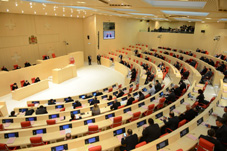Georgia to Tighten Labor Inspection Regulations
By Tea Mariamidze
Thursday, November 8


The draft law aims at defining the main requirements of labor safety and general principles of preventive measures at the workplace.
The legislative initiative envisages the creation and operation of a system of effective and working mechanisms of enforcement and inspection.
The mandate of the labor inspectorate is extended and, according to the draft law, the supervisory body is authorized to check any workspace covered by the inspectorate mandate without prior warning at any time of day or night.
Under the current law, the requirements of the law only covered 11 areas of severe, harmful and dangerous jobs and the regulations did not affect other fields of the work. However, the new version will cover all kinds of jobs.
Also, under the new amendments, the labor inspectorate does not require advance court permission and is authorized, without prior notice, to check any workspace subject to inspection, at any time of day or night, inspect, examine and check the workspace, which is necessary to ensure effective implementation and application of labor safety norms.
The current law reads that an employee has the right to receive compensation for injuries received at the workplace in accordance with the procedures established by the law, but after the amendments are adopted, an employee has the right to receive compensation for injuries received at the workplace, including injuries resulting from occupational disease.
In addition to this, if today prevention of the work of the supervisory body can result in a warning or a fine in the amount up to GEL 200, the new version reads that “preventing the supervisory body to carry out inspection will result in a fine in the amount of up to GEL 4,000 for an individual and up to GEL 14,000 for a person registered as a VAT taxpayer. The amount of the fine is linked to the income received during the previous calendar year and to the total amount of operations taxable under VAT.”
If the changes are adopted, the new regulations will enter into force on September 1, 2019.
